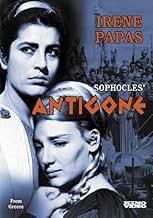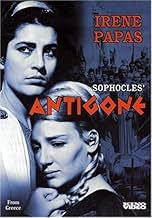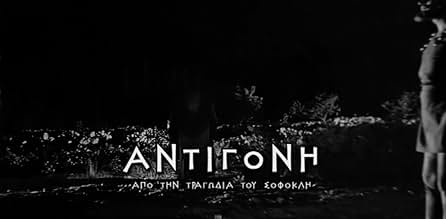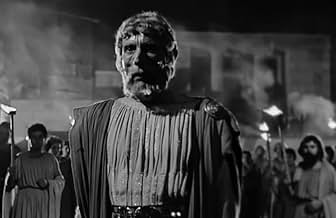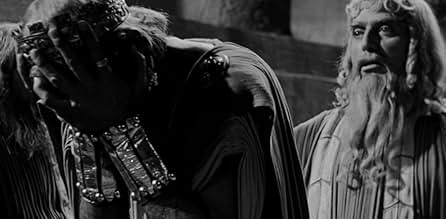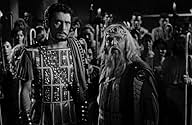अपनी भाषा में प्लॉट जोड़ेंAntigone defies her uncle's decree that her traitorous brother should go unburied and therefore find no rest in the afterlife; however, her actions have tragic consequences.Antigone defies her uncle's decree that her traitorous brother should go unburied and therefore find no rest in the afterlife; however, her actions have tragic consequences.Antigone defies her uncle's decree that her traitorous brother should go unburied and therefore find no rest in the afterlife; however, her actions have tragic consequences.
- पुरस्कार
- 3 जीत और कुल 1 नामांकन
Yorgos Karetas
- Elder of Thebes
- (as Giorgos Karetas)
Mimis Rougeris
- Elder of Thebes
- (as Dimitris Rougeris)
फ़ीचर्ड समीक्षाएं
Moral claims do not give rise to philosophical grounds. Yet, In Antigone it is clear that moral actions prompt philosophical questions, and inherently make good drama.
This review acts as a strict focus on how moral and ethical points are made throughout the film, and how they act as catalysts to progress the story and keep the viewer involved. Be it known that I have not read the Sopheclean text of Antigone, and fully derive all of my comments and criticisms solely within the boundaries of the film.
The character flaws present in the film mostly derive from wayward and distorted adherences to moral ideologies. For example, Antigone's ethical and moral backbone throughout the film is guided by powerful intangibles like love and loneliness, which makes her rash and at times misguided. Creon's moral code is also in knots as he acts as a Euthyphro in the fact that he is conflicted and contradictory to many of his beliefs that shape him, i.e. his aforementioned moral code.
Values undoubtedly shaped the society of Ancient Greece. Loyalty was a cornerstone value in this society, yet loyalty drifts and fades as tides turn in Antigone. For example, as Creon is crowned King of Thebes he is shown immediate support as the new benevolent King, yet mourning for Oedipus, or any mention of him whatsoever is non existent. Is this a loyal Thebes? Though support of Creon was warranted by his grace, the remembrances of a fallen king laid flat.
As Creon sits on his thrown surrounded by his court he states, "The country's foe is always mine." Little did Creon know that he was the biggest threat to his country, and thus his own foe. Because of the nature of Greek Tragedies and the intuition of most people, the common viewer could understand this at first glimpse. It was clear that Creon's hubris and pride would be his downfall.
Antigone, acting as the protagonist in the film, is the embodiment of good. Yet, contradictions within her moral ideology leads to questioning what "good" actually is. Is her entire moral and ethical embodiment good? Is it her choices of which moral standpoints to act upon that are what is good? Or is it her actions that are good? Simply put, Antigone is a walking paradox. It is impossible to know what is good. Acting against Zeus due to her undying love and care for her brother, or burying her brother because it is just in the Gods' eyes to do so. Both are contradictory and both can be good.
It is clear that both the protagonist and antagonist have inner conflicts. Their inner ideologies contradict. What makes one a "protagonist" and another an "antagonist" lies in the fact that the shared ideologies between them also conflict. Inner contradictions within an individual which conflict with another individuals already clashing ideologies makes it impossible to know who is right and who is wrong. Both characters were acting upon the same ethical grounds. They acted to safeguard human law, religious law, and family values. Is it then that moral grounds are shaped by convenience and circumstance? Does one's moral backbone fit the skeleton of a different distortion of themselves? Is moral rectitude a variable of space and time? Is it the contradictions of moral standpoints that are convenient because they can be malleable to fit any form? These are the questions that I believe the film poses.
The film does a fantastic job at examining exactly what grants a legitimate moral claim or action, which most people are curious about. Reason is man's most precious gift, and by the will of nature, the tone of his reasoning is determined by his moral code.
This review acts as a strict focus on how moral and ethical points are made throughout the film, and how they act as catalysts to progress the story and keep the viewer involved. Be it known that I have not read the Sopheclean text of Antigone, and fully derive all of my comments and criticisms solely within the boundaries of the film.
The character flaws present in the film mostly derive from wayward and distorted adherences to moral ideologies. For example, Antigone's ethical and moral backbone throughout the film is guided by powerful intangibles like love and loneliness, which makes her rash and at times misguided. Creon's moral code is also in knots as he acts as a Euthyphro in the fact that he is conflicted and contradictory to many of his beliefs that shape him, i.e. his aforementioned moral code.
Values undoubtedly shaped the society of Ancient Greece. Loyalty was a cornerstone value in this society, yet loyalty drifts and fades as tides turn in Antigone. For example, as Creon is crowned King of Thebes he is shown immediate support as the new benevolent King, yet mourning for Oedipus, or any mention of him whatsoever is non existent. Is this a loyal Thebes? Though support of Creon was warranted by his grace, the remembrances of a fallen king laid flat.
As Creon sits on his thrown surrounded by his court he states, "The country's foe is always mine." Little did Creon know that he was the biggest threat to his country, and thus his own foe. Because of the nature of Greek Tragedies and the intuition of most people, the common viewer could understand this at first glimpse. It was clear that Creon's hubris and pride would be his downfall.
Antigone, acting as the protagonist in the film, is the embodiment of good. Yet, contradictions within her moral ideology leads to questioning what "good" actually is. Is her entire moral and ethical embodiment good? Is it her choices of which moral standpoints to act upon that are what is good? Or is it her actions that are good? Simply put, Antigone is a walking paradox. It is impossible to know what is good. Acting against Zeus due to her undying love and care for her brother, or burying her brother because it is just in the Gods' eyes to do so. Both are contradictory and both can be good.
It is clear that both the protagonist and antagonist have inner conflicts. Their inner ideologies contradict. What makes one a "protagonist" and another an "antagonist" lies in the fact that the shared ideologies between them also conflict. Inner contradictions within an individual which conflict with another individuals already clashing ideologies makes it impossible to know who is right and who is wrong. Both characters were acting upon the same ethical grounds. They acted to safeguard human law, religious law, and family values. Is it then that moral grounds are shaped by convenience and circumstance? Does one's moral backbone fit the skeleton of a different distortion of themselves? Is moral rectitude a variable of space and time? Is it the contradictions of moral standpoints that are convenient because they can be malleable to fit any form? These are the questions that I believe the film poses.
The film does a fantastic job at examining exactly what grants a legitimate moral claim or action, which most people are curious about. Reason is man's most precious gift, and by the will of nature, the tone of his reasoning is determined by his moral code.
Antigone, written by Sophocles, is a characteristic Greek tragedy where the city's king, Creon, is faced with a moral dilemma that eventually hastens his fall from grace. Set in antiquity, the movie's plot is designed to question presupposed ideas of justice and wisdom as they were seen through the ancient Greek perspective.
In the movie, the protagonist, Antigone, is faced with a moral dilemma after her king, Creon, orders that her brother should be left unburied (a terrible punishment in ancient Greek culture since it would prevent his passage through the river Styx). Eventually, Despite the king's decree, Antigone decided that her brother's death with-out burial was unjust and challenged Creon's authority to prevent his burial by performing the ritual herself. After the discovery of her crime, Creon sentences Antigone to death – an act that created a great deal of unpopularity in the kingdom and incited lines of questioning very similar to contemporary Socratic arguments.
Creon's decision to sentence Antigone to death and her brother to a hellish afterlife were seen as unjust and despotic by the people of Thebes and caused his wisdom/authority to be questioned. Since ancient Greeks believed that the Sovereign set the morality of their city state, the act of questioning alone represents Socratic argument. Sophocles sets up questioning, in a manner very similar to Socratic arguments made through Euthyphro and Apology, by using Creon's own son and oracle to test Creon's judgment in an attempt to show that just being a king does not make someone wise or knowledgeable of justice.
The morality of Antigone eventually surfaces after Creon's fall from grace. At the end of the movie, Creon finally sees the error of his ways but Sophocles uses his downfall to express how even king's judgment can be governed through hubris instead of actual wisdom.
In the movie, the protagonist, Antigone, is faced with a moral dilemma after her king, Creon, orders that her brother should be left unburied (a terrible punishment in ancient Greek culture since it would prevent his passage through the river Styx). Eventually, Despite the king's decree, Antigone decided that her brother's death with-out burial was unjust and challenged Creon's authority to prevent his burial by performing the ritual herself. After the discovery of her crime, Creon sentences Antigone to death – an act that created a great deal of unpopularity in the kingdom and incited lines of questioning very similar to contemporary Socratic arguments.
Creon's decision to sentence Antigone to death and her brother to a hellish afterlife were seen as unjust and despotic by the people of Thebes and caused his wisdom/authority to be questioned. Since ancient Greeks believed that the Sovereign set the morality of their city state, the act of questioning alone represents Socratic argument. Sophocles sets up questioning, in a manner very similar to Socratic arguments made through Euthyphro and Apology, by using Creon's own son and oracle to test Creon's judgment in an attempt to show that just being a king does not make someone wise or knowledgeable of justice.
The morality of Antigone eventually surfaces after Creon's fall from grace. At the end of the movie, Creon finally sees the error of his ways but Sophocles uses his downfall to express how even king's judgment can be governed through hubris instead of actual wisdom.
This film, seen in my youth, has etched itself indelibly into my psyche. Achingly bleak, this story of a sister's love is portrayed in a classical style, with Irene Pappas powerfully projecting the character of the title role. This is a worthwhile way to use your valuable time.
The play 'Antigone', written by Sophocles in 441 BC is not just a great piece of theatre but also raises political, ethical and philosophical issues which render it timeless. The blind Tiresias upbraids King Creon with 'All tyrants are gluttons for their ill-gotten power' and warns him that he will pay a terrible price for having denied Polyneices burial and condemning Antigone to entombment.
Athenians at the time would certainly have related to the folly of tyranny.
Unlike most 'absolute rulers' he relents but alas too late.
This is a very accomplshed adaptation by writer/director Yorgos Tzavallas with a fine score by Argyris Kournadis.
The cast is uniformly excellent. The striking Irene Papas, no stranger to tragic Greek heroines on both stage and screen, deservedly won an award at the Berlin International Film Festival for her performance as Antigone. Her character arouses our sympathy but one should not forget that her grim fate and the play's tragedy stems as much from her own stubbornness as from Creon's intractability. Manos Katrakis is absolutely stupendous as Creon. He too was recognised for his performance at the International Film Festival in San Francisco. Papas and Katrakis went on to excel in 'Electra' for Cacoyannis two years later.
One does not have to be a classical scholar to appreciate this first class film but should seeing it arouse ones interest in the wonders of Greek tragedy then it has more than served its purpose.
...Or, Two Rights Make A Wrong. Over the years I've seen many versions of Antigone, both films and TV and even read two translations of the timeless tale by Sophocles but I was mainly interested in seeing this one as I've never heard it spoken in Greek before. Can't understand a word; whether it makes it more authentic or not is debatable - and after digesting all the concepts in the play whether you need another idea to debate is also debatable – but it certainly adds another dimension.
Strong minded woman Antigone wants to bury her brother Polyneices returned from exile who kills but is killed in battle by her other brother Eteocles who is feted as Thebes' saviour and given a hero's burial. Wilful King Creon decrees death to anyone honourably burying the traitor Polyneices bringing calamity and endless moral dilemmas for all concerned. Antigone is excellently played by Irene Papas, fresh from The Guns of Navarone the year before. This is Sophocles whizzed through in eighty minutes, concentrating on this wilfulness, pride and refusal to listen either to their gods, counsel or commonsense. It's been a salutary lesson for all people but especially despots and politicians of all eras; some wilfully blind leaders lead nations to war and destruction with their gods on their side and in the aftermath justify themselves even if it means black must be white and vv too of course. The ever modern tragedies are that the despots and politicians never heed the lessons in here though and indeed that ordinary people still desire shepherds to lead them. Without going into any of the moral and ethical points raised (plenty mentioned in other comments here) as a film it's a reasonable effort and well acted and engrossing enough although I'd always imagined Thebes to be a little grander somehow. If you're still unsure: memorable, lots to chew over but absolutely no laughs.
Strong minded woman Antigone wants to bury her brother Polyneices returned from exile who kills but is killed in battle by her other brother Eteocles who is feted as Thebes' saviour and given a hero's burial. Wilful King Creon decrees death to anyone honourably burying the traitor Polyneices bringing calamity and endless moral dilemmas for all concerned. Antigone is excellently played by Irene Papas, fresh from The Guns of Navarone the year before. This is Sophocles whizzed through in eighty minutes, concentrating on this wilfulness, pride and refusal to listen either to their gods, counsel or commonsense. It's been a salutary lesson for all people but especially despots and politicians of all eras; some wilfully blind leaders lead nations to war and destruction with their gods on their side and in the aftermath justify themselves even if it means black must be white and vv too of course. The ever modern tragedies are that the despots and politicians never heed the lessons in here though and indeed that ordinary people still desire shepherds to lead them. Without going into any of the moral and ethical points raised (plenty mentioned in other comments here) as a film it's a reasonable effort and well acted and engrossing enough although I'd always imagined Thebes to be a little grander somehow. If you're still unsure: memorable, lots to chew over but absolutely no laughs.
क्या आपको पता है
- ट्रिवियाThe movie sold 43,705 tickets. It came in 12th out of 68 movies.
- कनेक्शनReferenced in Dinos Katsouridis: Mia zoi san sinema (2012)
टॉप पसंद
रेटिंग देने के लिए साइन-इन करें और वैयक्तिकृत सुझावों के लिए वॉचलिस्ट करें
- How long is Antigone?Alexa द्वारा संचालित
विवरण
- चलने की अवधि1 घंटा 33 मिनट
- रंग
- ध्वनि मिश्रण
- पक्ष अनुपात
- 1.37 : 1
इस पेज में योगदान दें
किसी बदलाव का सुझाव दें या अनुपलब्ध कॉन्टेंट जोड़ें


